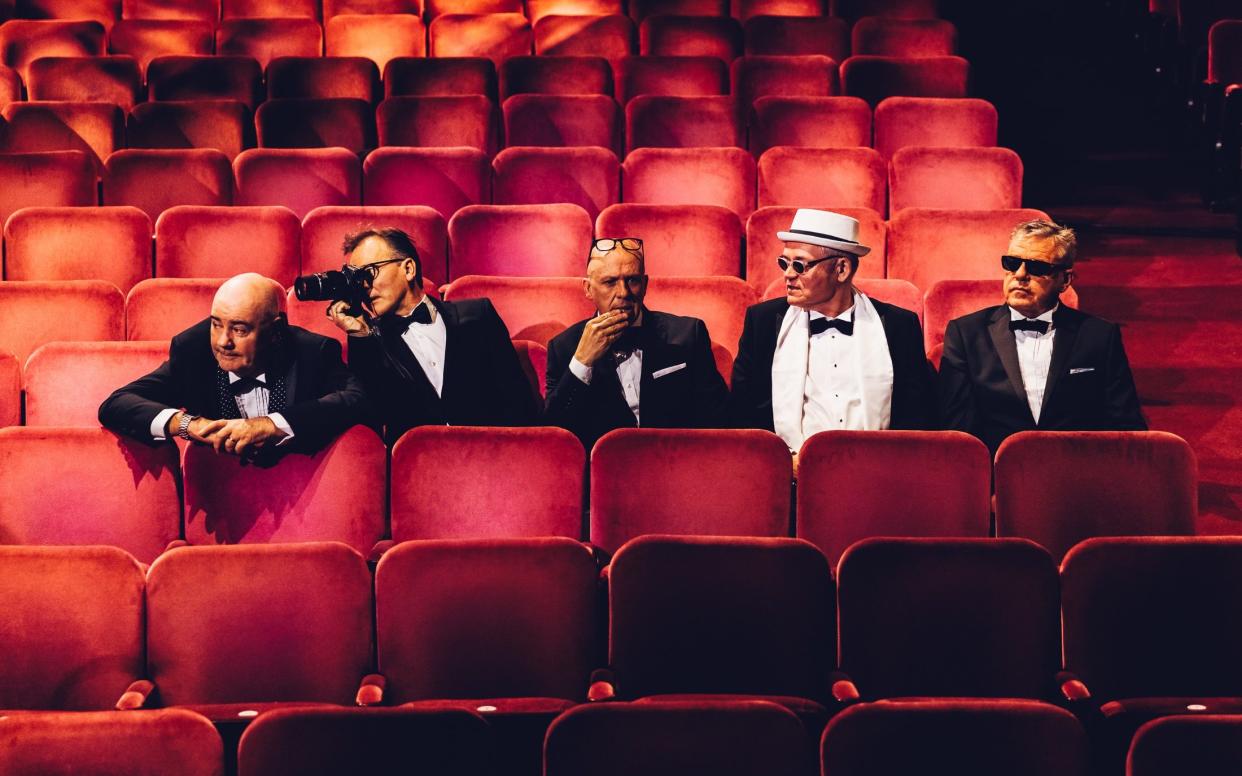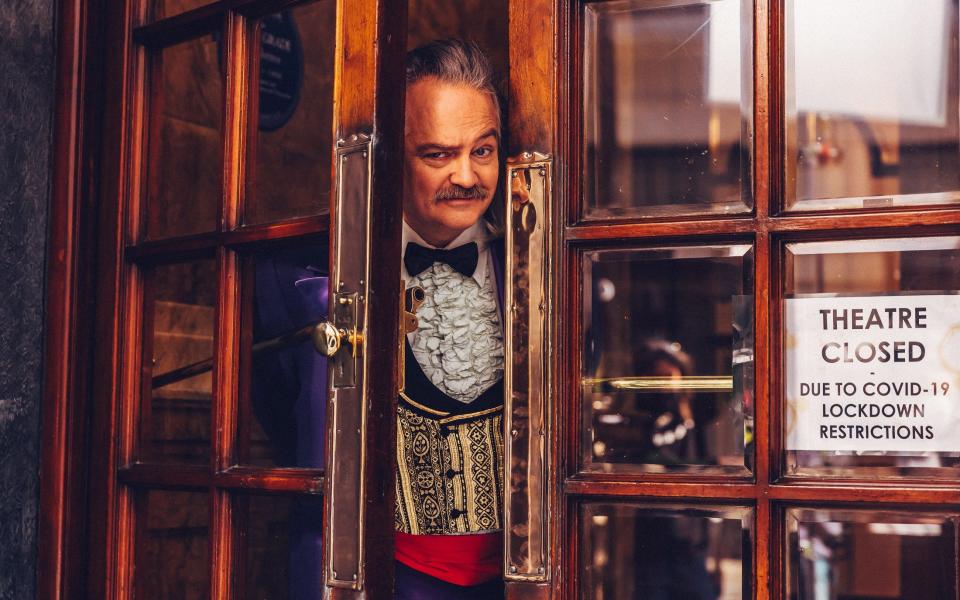Madness on gigs in the 1970s: ‘A load of Sieg Heil-ing, like something out of Nuremberg’

In this era of the musical livestream, it was always clear that Madness were going to do things differently. The doughty ska-pop survivors, a six-strong north London gang of one-time street toughs, are back on stage at the London Palladium tomorrow night with The Get Up! It’s part-concert, part-scripted origin story, tracing the band’s movements from 1977 to 1979. There’s a whiff of Ealing comedy, too, with a script from The Fast Show’s Charlie Higson, who also appears, as well as two “very special guests” who’ll be revealed on the night.
When I speak to frontman Suggs on the windy forecourt of a seafront hotel in Whitstable (he’s been there since the start of lockdown with Anne, his wife of 40 years), he tells me why he wanted to move away from what has become the norm.
“I’d seen quite a lot of these livestream things, and I just wasn’t digging them. Rock bands trying to pretend there’s fans there, giving it all the big moves and the devil fingers… But you can tell from the look in the singer’s eyes he’s not really getting anything back from an audience.”
Then, in November, Suggs caught the Brit Awards’ biggest winner Dua Lipa’s 2054 livestream, a £1 million extravaganza watched by a worldwide audience of five million.
“What a performance!” exclaims the 60-year-old, in the kind of white working-class London accent you don’t hear any more. “And all that work that went into it! Not that we’re ever prepared to do that amount of work. But we have always had a theatrical side to us, and a certain exhibitionism.”
There is also, I would argue, a rawness to Madness, a lack of artificiality that has endured through the decades. Suggs (real name Graham McPherson) attributes the band’s longevity to the fact that “we were friends first. We weren’t cherry-picked to be in a band. Malcolm McLaren put the Pistols together. Jerry [Dammers] picked the people he thought would suit The Specials. So the band itself was almost a by-product of the friendship, as opposed to the other way round. And that lasted all the way through.”

The band also bonded through teenage criminality (burglary, shoplifting, vandalism, train-robbing) and the fact that they all came from challenging backgrounds. Suggs’s father was a heroin addict who died in Tooting Bec Asylum, and his mother almost lost her son to social services.
“We were like a surrogate family for each other. We were arguing the other day, saying that all our dads left. And Chris [Foreman, guitarist] pipes up: ‘My dad didn’t – my mum did!’” he laughs. “Apart from Bedders [Mark Bedford, bassist], all of us lived in one-parent families and in poverty, to a greater or lesser extent.”
The Get Up! acts as a companion piece to another depiction of the band’s beginnings, the three-part docu-series Before We Was We, which has just premiered on BT TV. The show, rich in archive footage, is a brilliant evocation of the rough-and-tumble of London in the mid-to-late 1970s. Both projects starkly portray an era when the young band found themselves at a crossroads of Mods and punks and skinheads, many of the latter of a National Front-supporting, racist bent.
“It was a very aggressive time,” reflects Suggs, wincing still, over a lunchtime ham, egg and chips. “There was fighting everywhere you went when I was a kid. You woke up scared, and you went to bed scared. Just walking around in a tonic suit would create a lot of anger in people who looked like Kevin Keegan.”

To the era’s hard-of-thinking tribalists, Madness’s own look – suits, boots, Crombies, braces, shorn skulls – sent mixed messages. To some it denoted what the band intended: a love of good clothing and two-tone, ska and reggae, a look as uniting and consistent as their playful “Nutty Boy” demeanour. To others, however, it chimed with fascist sympathies.
“That was enormously difficult. Racism was endemic then – Alf Garnett and Love Thy Neighbour were being broadcast on television night after night. But we just knew that we weren’t [racist], and also that we were playing music that was influenced by black people.”
The band’s tight friendships stood them in good stead – as did the deployment at their gigs of a six-foot-two former SAS man, dispatched into audiences to deal with “troublesome skins”. Nonetheless, for the man at the front, “it just got a bit shocking – playing at [Camden’s] Electric Ballroom and seeing a load of Sieg Heil-ing, like something from a Nuremberg rally. Extraordinary.”
Madness survived that madness, too, becoming one of the biggest British pop bands of the 1980s, with 21 Top 20 hits. Their proud London identity kept them grounded, even as Suggs acknowledges that it put something of a limit on how far they could reach and travel.

“Possibly in terms of America, although Our House was a hit there. In Europe, it wasn’t a problem at all, but in America, yeah, it was a bit of a struggle.”
Madness then crafted a middle-age on their own terms. Their ninth album, The Liberty of Norton Folgate (2009), was one of the best reviewed of their career – proving there was no need to exploit the 1980s heritage circuit, although they nearly fell into that trap. After Madstock, their 1992 reunion concert, Suggs tells me: “Suddenly we were getting all these offers to go on tour with The Thompson Twins and T’Pau.” As sharp-dressed and sharp-opinionated now as he ever was, Suggs shoots me an “as if” look as he assembles another roll-up.
How would he define the relationships between the members of Madness today? “Close, but not claustrophobically so,” he replies. “The self-deprecation thing is primarily what carries us. We can all take the piss out of ourselves, and each other, in a way that other people might find a bit disturbing.
“Our friendship would survive without the music. But the music is a bonus.”
The Get Up! streams at 8.30pm tomorrow. Info: shops.ticketmasterpartners.com. Before We Was We is available on BT TV now


